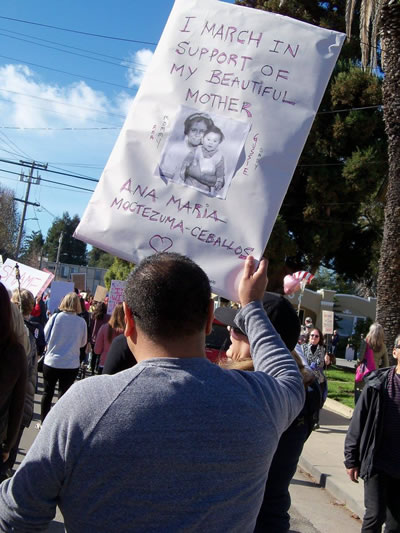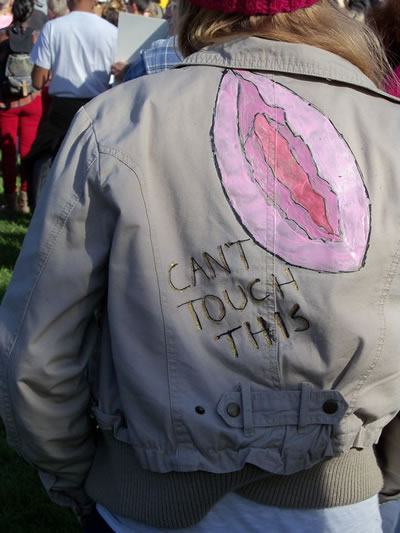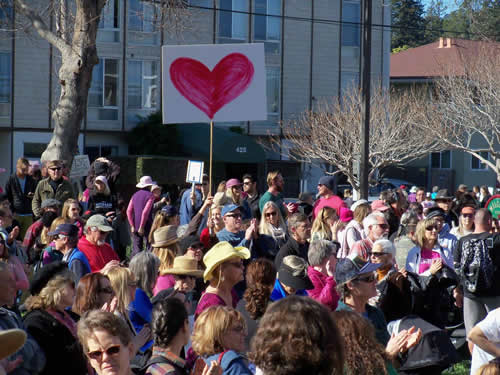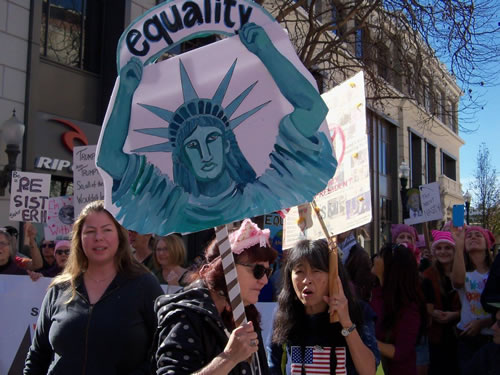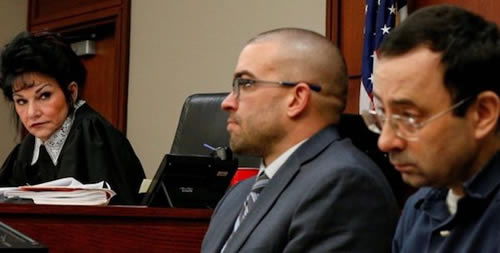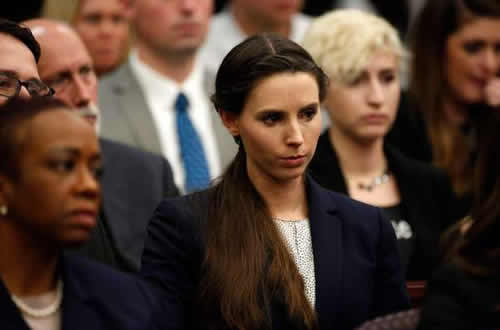

Communion by Lucinda Abra.
Take a Step BackDear Friend and Reader: It's taken me a while to figure out what's really going on with the #MeToo movement, at least so far as I can tell. I don't accept as valid what I don't understand, or what I see serious problems with. I might, when I gain an understanding, and see past the problems. The #MeToo movement has been chaotic, and there are some issues, which I'll get into in a moment. Finally, about five drafts into this article and after consulting many women in my life, I spoke with an old friend named Megan O'Connor, who was well on her way to being a midwife when I knew her as a journalism colleague 20 years ago.
Workplace sexual harassment and sexual assault are real problems -- so real that we're discovering they're apparently the norm. #MeToo is intended as a pushback against that, calling attention to the issue and demanding change. As Ruth Bader Ginsberg said, it's about time. Yet this is no guarantee of solving the problem. But it may be a start. Real activism is always messy. And sometimes it's necessary to break some rules and smash things to get the attention of people in power. Let's see how events proceed from here -- for example, if we can do anything about an admitted sexual abuser that a majority of white women helped elect president. We might be witnessing a correction, not just of abusive conduct, but also to complicity with that conduct. There's been one other important effect, which is a realtime experiment with what happens when society bursts into a discussion about shadow sexual issues. We can study ourselves, our friends, the public and the press for information. And in other news, at press time, The Bulletin of the Atomic Scientists moved the Doomsday Clock, a metaphor for humankind's proximity to global nuclear annihilation, ahead by 30 seconds on Thursday. It is now set at two minutes to midnight. The group says this is the "closest to the symbolic point of annihilation that the clock has been since 1953 at the height of the Cold War." Scandals Are Not About Healing My concern with #MeToo began right before activist Tarana Burke's political slogan was taken over by what I'm calling #Me2.0, the internet version. My concern began the moment Harvey Weinstein was taken down. That was quite a scandal. We don't know most of it, either. While it was satisfying to see such a monster tumble, scandal is never life-affirming. Rather, its effect is to repress sexual and loving feelings, spreading into our intimate relationships, contaminating healthy erotic desire and sowing mistrust. This is no way to run a free society; in fact, scandals are a good way to destroy one. This struck me as a bad omen, particularly if we remember that "the end is written in the beginning." Scandals terrify people, and most are already terrified. Ask any teenage boy who's afraid to ask a girl on a date, fearing he will be deemed a sexual predator. That is a form of tyranny.
The sex abuse situation in prisons is ugly, and most prisoners are men of color who don't belong there. But what happens in prisons is easy to ignore, and is almost always is ignored. And does anyone remember Jerry Sandusky and company? These are very unlikely to be "isolated incidents." Solving the sexual assault problem for half the population -- to the extent that's even true -- is not solving it at all, particularly since most perpetrators were once victims. More young boys than you care to imagine are inappropriately touched by supposed caregivers and others charged with responsibility for them -- both male and female. In a best case scenario, even "mild" abuse experienced as a child can make it difficult for people to establish trust in others later in life. I am being told that to equate the abuse that girls and women experience with what boys and men experience is "false equivalency." I am not quite up to understanding that. If you can explain it in terms a kid can understand, I would appreciate your thoughts. After much reflection, my suspicion of any viewpont that discounts or ignores the maltreatment of boys and men is that it's silently based on the gender stereotype that they should "man up and take it." And I dread to think there is any motive of giving men and boys "a taste of their own medicine." Three-Part Disharmony There seem to be three main aspects to the #MeToo trend. One has been celebrities taking out other celebrities, outing their alleged sexual misconduct, which leads to an epic fall from grace. The reported misconduct often turns out to be disgusting and persistent, and somehow it went unchallenged for years or decades. We don't seem too curious about who all the enablers were, or what H.R. had in its files. In the especially horrific case of Dr. Larry Nassar, the investigative reporter in me wants to see every page of the personnel files of the U.S. Olympic gymnastics team. Who exactly knew what, and when did they know it? On what basis were key decisions made? How exactly did this go on for a generation, with so many people of power and influence watching? What, exactly, did parents know, and what did they do? [See related article by Amanda Painter.] Other times, the alleged violation is immature, inconsiderate but comparatively harmless behavior. The second is that some women who don't have a public profile are finding the courage and voice to express their previous experiences of workplace sexual harassment, and how they feel about it. This has expanded into coming out about other forms of abuse, ranging from catcalls to date rape to issues within the family. One thing we're learning is that, for many people, the entire sexual environment is one they associate with transgression and violation. We really need to do some soul searching about how this came to be, how it's persisted so long, and how we're going to actually solve the problem. The Women's Lib movement of the 1970s stopped far short of structural change. Lacking actual power, and seeking employment opportunities above all else, many women went from one form of subservience to another. I recently asked my readers if they had experienced, or knew of, any positive results from #MeToo -- results in the real world; not on the internet, and not involving famous people. There seemed to be some.
Someone else wrote, "My manager, in a face-to-face meeting, asked me if any of his actions have ever made me feel uncomfortable in any way. They hadn't, and I appreciated his proactive approach, though I doubt that I would have felt comfortable sharing with him that they had, in the event that they had. It's a challenging issue to deal with regardless of how well-intentioned someone may be." Hmm, that sounds like more of the same thing that got us here. Does someone need to tell women -- even now -- that nobody gives you a voice? You already have one, and you either use it, or you don't use it. Then there's the third kind of response: concern from women about larger issues. One reader in the UK responded for herself and her friends, "This #MeToo thing is making us all very uncomfortable. Of course it's emotionally satisfying in many cases to see long-term sexually abusive predators like Weinstein get called out and pulled down, but one thing we've noticed (and worry about) is that 1/ most of the pushback when it has been there by Weinstein and other men has been against accusers who are women of color; 2/ there's been false equivalence between making a pass/minor groping and violent abuse or sustained harassment; 3/ it's untrue that somehow everything will be ok if the film industry, senate, whatever, is 'purified' without structural change; 4/ the possibility of 'kicking 'em in the balls' (direct self-defense) has been absent; 5/ the daily, sustained abuse of women at the lower end of the pay scale, especially women working in hotels or more private domestic settings, or by the state in prisons/detention centers, has been completely out of the discussion; 6/ structural solutions like universal basic income, which would give every woman more power to refuse, have been completely out of the discussion. Last but certainly not least, we're also worried about the compete lack of any process to determine whether a claimed incident happened or not." She concluded, "We've all seen others or actually been accused ourselves of being 'rape apologists' when we've tried to help abusive men stop abusing before this, and now are worried that if we try to have a more nuanced discussion in public about #MeToo that we'll be accused of 'rape apology' all over again." [emphasis added]. Tale of the Author of A Handmaid's Tale Margaret Atwood, author of A Handmaid's Tale, which is taken as the morality story of our day, wrote recently in the Globe and Mail about times in history when "the usual rules of evidence are bypassed." Many have pointed out that the men who have been taken out in the #MeToo trend have been "guilty because accused," and that this is not a useful legal or moral standard. Atwood has a special place in the history of the women's movement, as one of its most articulate and inspiring authors, and also as someone who has been repeatedly accused of being a bad feminist.
"As for vigilante justice -- condemnation without a trial -- it begins as a response to a lack of justice -- either the system is corrupt, as in prerevolutionary France, or there isn't one, as in the Wild West -- so people take things into their own hands. "But understandable and temporary vigilante justice can morph into a culturally solidified lynch-mob habit, in which the available mode of justice is thrown out the window, and extralegal power structures are put into place and maintained. The Cosa Nostra [the Mafia], for instance, began as a resistance to political tyranny." She got in trouble with internet feminists for writing that. Frail as Victorian Housewives? Writing earlier this year in The New York Times, Daphne Merkin published an op-ed called, "Publicly, we say #MeToo. Privately, We Have Misgivings." She wrote, "Perhaps even more troubling is that we seem to be returning to a victimology paradigm for young women, in particular, in which they are perceived to be -- and perceive themselves to be -- as frail as Victorian housewives." She continued: "What happened to women's agency? That's what I find myself wondering as I hear story after story of adult women who helplessly acquiesce to sexual demands. I find it especially curious given that a majority of women I know have been in situations in which men have come on to them -- at work or otherwise. They have routinely said, 'I'm not interested' or 'Get your hands off me right now'. And they've taken the risk that comes with it.
Among many other excellent points, she asks, "And what exactly are men being accused of? What is the difference between harassment and assault and 'inappropriate conduct'? There is a disturbing lack of clarity about the terms being thrown around and a lack of distinction regarding what the spectrum of objectionable behavior really is." If this is some foreshadowing of the "the future is female," no thanks -- I'll stick to patriarchy. At least there, one has a right to face and question one's accuser. The shrill, sick irony of this scenario is that we've purged ourselves of a bunch of creepy entertainers and alleged newscasters, the Olympic gymnastics team doctor and a bunch of other people whose behavior was well known, sometimes for decades. But someone who bragged about committing sexual assault received a majority of white women's votes, and is still in power. That deserves a reckoning. It was a profound relief that the anti-workplace-harassment movement joined forces with the nationwide protests by women on Jan. 20 and 21. I have read that protest leaders then headed to Las Vegas to organize voter registration in swing states ahead of the 2018 congressional elections. That is called linking the issues. It should be clear to men that it's time to take a step back and evaluate our ideas about who and what women are, and how to approach women in social and professional situations. It should also be clear that we all need to arrive at a mutually acceptable concept of respect, which can only come through a dialog.
Anyone who has experienced sexual transgression and is still in pain needs to speak up where it matters, and get help. The first place that must happen is within their intimate relationships. Anyone who cannot share their history with their partner is not in a safe place. A trend on the internet is not about actual healing, and does not rise to the level of claiming power. Power is not a mood or a feeling. It's a state of being focused in the present, where a situation can be sized up, and necessary decisions made. Power is about commitment. It's about working together, toward tangible, productive goals, including working with one's presumed adversaries. In my theory of the universe, women, as the source of life, are the teachers. Whether one is right, wrong, or somewhere between, teaching happens by example. If men are being presumed to be in some way ignorant or in need of correction, it will presumably be women who do the teaching -- and that will not happen with their words. It will be conveyed by women demonstrating what they believe is correct, through their actions. Yours & truly,  Planet Waves (ISSN 1933-9135) is published each Sunday and Thursday evening in Kingston, New York, Planet Waves, Inc. Core Community membership: $197/year. Editor and Publisher: Eric Francis Coppolino. Web Developer: Anatoly Ryzhenko. Astrology Editor: Amanda Painter. Client Services: Amy Elliott. Eric's Assistant: Ellen Dockery. Astrology Fact Checker: Len Wallick. Copy Editor and Fact Checker: Jessica Keet. Media Consultant: Andrew Ellis Marshall McLuhan. Music Director: Daniel Sternstein. Bass and Drums: Daniel Grimsland. Additional Research, Writing and Opinions: Amy Jacobs, Cindy Ragusa and Carol van Strum.
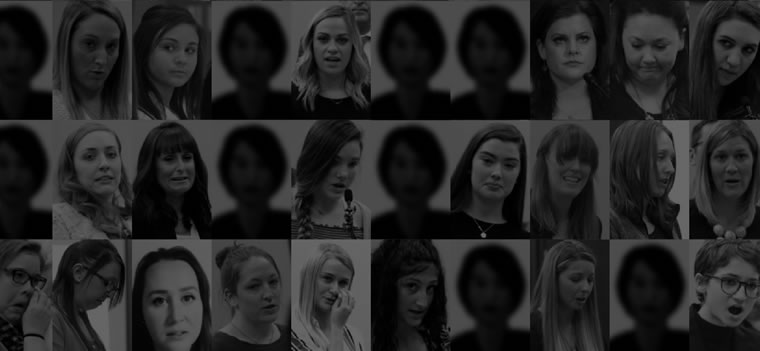
Some of the many women gymnastics team members and student athletes from Michigan State University abused by Dr. Larry Nassar. Graphic: NY Times.
Sentencing Dr. NessusBy Amanda Painter Larry Nassar, the former team doctor for the U.S. Olympic gymnastics team, USA Gymnastics and Michigan State University (MSU), was sentenced on Wednesday to 40-175 years in prison for serial sexual assault. Although he was only convicted on seven counts of first-degree criminal sexual conduct after finally pleading guilty in November, approximately 160 women have provided victims' impact statements (like this one) to the court over the last week. Action against Nassar pre-dates the "Weinstein effect" and the current "MeToo" movement, though undoubtedly the current social environment has lent courage to many of his victims who've spoken out at his trial, and lent additional credence to their testimony. USA Gymnastics says they cut ties with Nassar in 2015 in response to "athletes' concerns," and the FBI began questioning him in September 2016.
Yet complaints about sexual abuse by Nassar date back to the 1990s. According to Michigan Live: "In the late 1990s, a teenage gymnast, an MSU softball player and an MSU long-distance runner claim they complained to MSU coaches and/or athletic trainers about Nassar's intravaginal treatments, according to lawsuits. In each case, the women claim they were told that Nassar was a renowned doctor and knew what he was doing, the lawsuits say. Three alleged victims say they brought concerns to MSU gymnastics coach Kathie Klages as early as 1997. Klages retired Feb. 14, 2017, after being suspended by the university. However, MSU spokesman Jason Cody has said there is no record of MSU receiving any complaint involving Nassar before 2014." There's record of a 2004 complaint made to police in Michigan's Meridian Township by a teenage athlete treated by Nassar at MSU's sport-medicine clinic; that complaint was dropped or dismissed by authorities. And according to a court document in Ingham County, Michigan, the 12-year-old daughter of a family friend allegedly told her parents and a counselor of being sexually abused by Nassar. Again, according to Michigan Live, "The court document says the counselor called a meeting between Nassar and the girls' parents in which Nassar denied the abuse and the girl's parents forced her to recant." Other examples of adults failing to see red flags or flat-out disbelieving children and teenage girls abound in Larry Nassar's history. Certainly one contributing factor is the blurring effect of the Olympic Dream: families go all-in when a teenager is pursuing Olympic greatness; it takes an incredible amount of money, dedication, time, support and focus. Nassar also reportedly groomed his victims and their families quite well, just like Catholic priests who've committed sexual abuse. It's the same playbook: use status and the innate trust people place in certain professions, win over parents and other adults with friendliness and generosity, and they are often much less likely to believe kids.
That the income they earn on the backs of female teenage gymnasts might be anything but clean and deserved is likely a taboo topic. There's an established history of such problems in amateur athletics, particularly on the university level. Although we do not have a birth time for Nassar, Eric has cast a noon chart for him; you can see that and some preliminary discussion on Eric's Facebook page. With a noon chart it is important to remember that you have to ignore the houses and angles: without an accurate birth time, we can't know what houses the signs and planets fall into. But you can still get tremendous information from planets' aspects to each other and the signs they occupy. Speaking broadly: Jupiter roughly square Nassar's Cancer Moon and North Node seems to have imparted a "pseudo-parent-guru archetype; he’s easily able to convey trust, nurturing, knowledge and leadership" according to one comment under the chart. A T-square between Venus in Leo, Saturn and Pholus in Aquarius, and Neptune and the Black Moon Lilith in Scorpio speaks to some self-delusion around sex, issues with love, and some kind of runaway-authority complex in elite groups. Nassar also has Nessus -- the primary centaur about sexual transgressions, patterns of abuse, and 'stopping the buck' -- in Gemini. Making tight aspects to it along the mutable-sign cross are several objects that speak of power and the overreach of power. One that really caught my eye is Tantalus in Sagittarius, which is opposite Nassar's Nessus in Gemini. From Wikipedia: "Most famously, Tantalus offered up his son, Pelops, as a sacrifice. He cut Pelops up, boiled him, and served him up in a banquet for the gods. The gods became aware of the gruesome nature of the menu, so they did not touch the offering; only Demeter, distraught by the loss of her daughter, Persephone, absentmindedly ate part of the boy's shoulder." If that is not a perfect metaphor to describe Nassar's crimes, the situation of other people in power who kept their distance, and the "absentminded" feeding off of sacrificed children, I don't know what is. To unsubscribe, click here. To unsubscribe from all future Planet Waves emails, please write to cs@planetwaves.net Copyright © 2018 by Planet Waves, Inc. All Rights Reserved. Other copyrights may apply. Some images used under Fair Use or Creative Commons attribution. |
